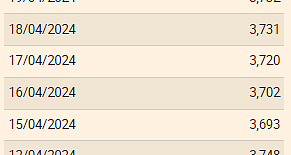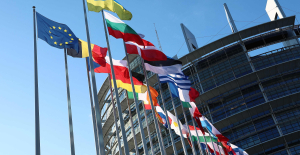Austin, who considers China the U.S. army's most serious long-term threat, but has been forced into focusing heavily on Russia this past year, requested a telephone conversation with Gen. Wei Fenghe. This was after months of unsuccessful attempts to talk with Gen. Xu Qiliang (the highest ranking uniformed officer within the Communist Party military structure).
Austin wanted to speak to Xu as he is the deputy chairman of the party's Central Military Commission. This commission controls the People's Liberation Army. Beijing refused to compromise and allowed Austin to speak to Wei. Wei is Austin's counterpart as defense minister, but he ranks lower in the hierarchy than Xu and has less military operational clout.
Austin's predecessors had often spoken with Wei. Most recently, on Aug. 6, 2020 Mark Esper, then-Defense Secretary, raised with Austin a U.S. request to have more transparency on the origins COVID-19 as well as other issues.
According to a senior defense official involved in the arrangement, Austin did not expect to make a breakthrough with Wei.
The Pentagon stated that Austin and Wei had discussed U.S.-Chinese defense relationships, regional security issues, and "Russian's unprovoked invasion" of Ukraine in a short statement following the call. It did not provide any details.
Beijing's defense ministry provided a more detailed account. According to the defense ministry in Beijing, Wei "expressed his solemn position on Taiwan and stressed that Taiwan is an unalienable part China. It is a reality and fact that can't be changed."
According to the ministry, the two men had a discussion on "maritime security and air security questions." Wei also told Austin that China demands that the United States cease military provocations at sea, and that it not use the Ukrainian question to discredit, threaten, and pressure China.
According to Xinhua News Agency, Wei said that China wants to have "sound and stable" relations with the United States. According to the report, Wei said that "the United States should never underestimate China's determination & capability."
The call lasted approximately 45 minutes and Austin was referring to President Joe Biden’s video call on March 18 with President Xi Jinping in which he outlined stiff consequences for the Chinese if they provide military or economic support to Russia's war against Ukraine. The White House did not indicate that Biden had received any assurances from China's leader.
Washington has long portrayed China, as a country seeking to reshape international order in order to better defend its national interests and build sufficient military power to eventually replace the United States as Asia's dominant power.
Since Biden's election, the U.S.-China relationship has been more complicated than ever. Biden has repeatedly criticised China for military provocations towards Taiwan, abuses of ethnic minorities as well as efforts in Hong Kong to suppress pro-democracy activists. American officials have also expressed concern over China's massive increase in the size of its nuclear arsenal. However, it is still far smaller than America.
The senior defense official stated that Austin repeated Biden's message on Wednesday about the importance of managing U.S. China strategic competition. This includes in the nuclear, cyber, and space arenas. He also stressed the need to improve crisis communications between global powers.
The official also expressed concern about Washington's military provocations against Taiwan, an island democracy which Beijing insists must be united with China's mainland. The official also raised concerns from the U.S. about Chinese activities in South China Sea, and East China Sea. He also expressed concern about the U.S.'s worries about North Korea’s nuclear weapons program.
With the Russian invasion, it may seem that the long-strained relationship between America and China has reached a new low. While Beijing tried to distance itself from the conflict, it avoided criticizing Moscow. Beijing's provocative actions at other times include amplifying unverified Russian claims about Ukraine running chemical and biological weapon labs with U.S. assistance.
American officials expressed concern about the possibility of a Moscow–Beijing alliance with authoritarian states. In February, Xi and Russian President Vladimir Putin stated that the friendship among their countries "has not limits." However, it remains to see if the Russian invasion of Ukraine has cooled Xi’s desire for closer ties.
The first high-level meeting between the Biden administration and Chinese officials took place in March 2021. Secretary of State Anton Blinken, Jake Sullivan (Biden's national security advisor), met with their Chinese counterparts in Anchorage, Alaska. They were surprised by their hosts' complaints about a variety of issues.
There have been several phone and video calls since then between Blinken, Chinese Foreign Minister Wang Yi, but very few meetings in person. These calls were dominated by current issues, including Afghanistan, Russia's invasion in Ukraine, North Korea, and Iran. Blinken has not yet visited China and Wendy Sherman , Deputy Secretary of States, is the highest ranking U.S. diplomat who has traveled to that country.

 The Euribor today remains at 3.734%
The Euribor today remains at 3.734% Germany: the trial of an AfD leader, accused of chanting a Nazi slogan, resumes this Tuesday
Germany: the trial of an AfD leader, accused of chanting a Nazi slogan, resumes this Tuesday New York: at Columbia University, the anti-Semitic drift of pro-Palestinian demonstrations
New York: at Columbia University, the anti-Semitic drift of pro-Palestinian demonstrations What is Akila, the mission in which the Charles de Gaulle is participating under NATO command?
What is Akila, the mission in which the Charles de Gaulle is participating under NATO command? What High Blood Pressure Does to Your Body (And Why It Should Be Treated)
What High Blood Pressure Does to Your Body (And Why It Should Be Treated) Vaccination in France has progressed in 2023, rejoices Public Health France
Vaccination in France has progressed in 2023, rejoices Public Health France Food additives suspected of promoting cardiovascular diseases
Food additives suspected of promoting cardiovascular diseases “Even morphine doesn’t work”: Léane, 17, victim of the adverse effects of an antibiotic
“Even morphine doesn’t work”: Léane, 17, victim of the adverse effects of an antibiotic MEPs validate reform of EU budgetary rules
MEPs validate reform of EU budgetary rules “Public Transport Paris 2024”, the application for Olympic Games spectators, is available
“Public Transport Paris 2024”, the application for Olympic Games spectators, is available Spotify goes green in the first quarter and sees its number of paying subscribers increase
Spotify goes green in the first quarter and sees its number of paying subscribers increase Xavier Niel finalizes the sale of his shares in the Le Monde group to an independent fund
Xavier Niel finalizes the sale of his shares in the Le Monde group to an independent fund Owner of Blondie and Shakira catalogs in favor of $1.5 billion offer
Owner of Blondie and Shakira catalogs in favor of $1.5 billion offer Cher et Ozzy Osbourne rejoignent le Rock and Roll Hall of Fame
Cher et Ozzy Osbourne rejoignent le Rock and Roll Hall of Fame Three months before the Olympic Games, festivals and concert halls fear paying the price
Three months before the Olympic Games, festivals and concert halls fear paying the price With Brigitte Macron, Aya Nakamura sows new clues about her participation in the Olympics
With Brigitte Macron, Aya Nakamura sows new clues about her participation in the Olympics Skoda Kodiaq 2024: a 'beast' plug-in hybrid SUV
Skoda Kodiaq 2024: a 'beast' plug-in hybrid SUV Tesla launches a new Model Y with 600 km of autonomy at a "more accessible price"
Tesla launches a new Model Y with 600 km of autonomy at a "more accessible price" The 10 best-selling cars in March 2024 in Spain: sales fall due to Easter
The 10 best-selling cars in March 2024 in Spain: sales fall due to Easter A private jet company buys more than 100 flying cars
A private jet company buys more than 100 flying cars This is how housing prices have changed in Spain in the last decade
This is how housing prices have changed in Spain in the last decade The home mortgage firm drops 10% in January and interest soars to 3.46%
The home mortgage firm drops 10% in January and interest soars to 3.46% The jewel of the Rocío de Nagüeles urbanization: a dream villa in Marbella
The jewel of the Rocío de Nagüeles urbanization: a dream villa in Marbella Rental prices grow by 7.3% in February: where does it go up and where does it go down?
Rental prices grow by 7.3% in February: where does it go up and where does it go down? Europeans: “All those who claim that we don’t need Europe are liars”, criticizes Bayrou
Europeans: “All those who claim that we don’t need Europe are liars”, criticizes Bayrou With the promise of a “real burst of authority”, Gabriel Attal provokes the ire of the opposition
With the promise of a “real burst of authority”, Gabriel Attal provokes the ire of the opposition Europeans: the schedule of debates to follow between now and June 9
Europeans: the schedule of debates to follow between now and June 9 Europeans: “In France, there is a left and there is a right,” assures Bellamy
Europeans: “In France, there is a left and there is a right,” assures Bellamy These French cities that will boycott the World Cup in Qatar
These French cities that will boycott the World Cup in Qatar Serie A: Bologna surprises AS Rome in the race for the C1
Serie A: Bologna surprises AS Rome in the race for the C1 Serie A: Marcus Thuram king of Italy, end of the debate for the position of number 9 with the Blues?
Serie A: Marcus Thuram king of Italy, end of the debate for the position of number 9 with the Blues? Milan AC-Inter Milan: Thuram and Pavard impeccable, Hernandez helpless… The tops and flops of the derby
Milan AC-Inter Milan: Thuram and Pavard impeccable, Hernandez helpless… The tops and flops of the derby Ligue 2: Auxerre leader, Bordeaux in crisis, play-offs... 5 questions about an exciting end of the season
Ligue 2: Auxerre leader, Bordeaux in crisis, play-offs... 5 questions about an exciting end of the season


















